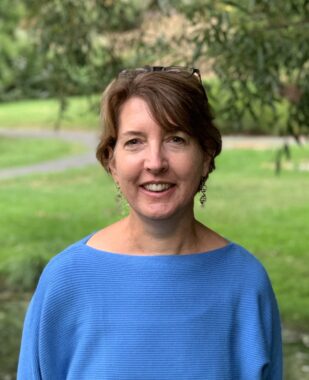‘Livable Lives’ gives a voice to the Huntington’s community, part 1
A chat with Christy Dearien about the families she interviewed for her book
Written by |

First in a series.
My wife, Jill, and I met Christy Dearien last year at a Huntington’s disease (HD) event in Maryland. Like Jill, Dearien’s brother is gene-positive for HD. Dearien had just published a book, “Livable Lives: Conversations with the Huntington’s Disease Community,” exploring how this incurable disease affects relationships, identity, life decisions, and more. We recently chatted about the book via email. Excerpts of our conversation follow.
CB: ‘Livable Lives’ weaves together your family’s journey with stories from around the world. What made you feel ready to publicly share such vulnerable experiences?

Christy Dearien is the author of “Livable Lives: Conversations with the Huntington’s Disease Community,” available on Amazon. (Courtesy of Christy Dearien)
CD: My family didn’t learn about HD until my older brother was diagnosed in 2014. My dad and grandpa both struggled with mental illness, but without an HD diagnosis, my family never understood why. At that time, talking about mental illness was still taboo, so I became very accustomed to not talking about my family. When my brother was diagnosed, I didn’t know how to share my family’s experiences.
That all changed after I tested negative. I felt compelled to do something to build understanding around HD families and make it easier for people like me to talk about the disease. That feeling continued to grow until I couldn’t ignore it anymore. To tell the story I wanted to tell, I knew I needed to write about my own experiences, no matter how difficult it was.
Sharing my family’s story and my own feelings about the disease took practice. I became more comfortable over time and felt ready to share my story publicly when the book was published. I’m so glad I took that leap.
Stigma and silence are huge barriers in the HD community. When you set out to write this book, how did you create space for honest conversation, and how did those conversations change you?
Before I interviewed the book’s storytellers, I thought a lot about how scary it might be for some people to share their stories, especially those who had never done so publicly. It was important to me that storytellers felt comfortable with the process from beginning to end: They didn’t have to answer interview questions that made them uncomfortable; they had the option to use a pseudonym; they had multiple opportunities to request changes to their stories; and they always had the option to withdraw altogether.
I did very little talking during these conversations to give people space to share their stories the way they wanted to. These were their stories, not mine. Writing the book was a long process, so storytellers had time to reflect and make sure they were comfortable with the result before the book was published.
I will be forever grateful for this experience. These conversations expanded my understanding of HD and the many ways it impacts our families. They also increased my respect and admiration for the people who make up this community.
The biggest change for me, personally, is that I found my voice. I’m now part of the conversation.
How has the ‘livable life’ philosophy shaped your own choices, and what would you say to someone struggling with fear or uncertainty about their genetic risk?
When one of the storytellers told me about her “livable life,” I felt like she had given a name to something I heard in many of my conversations. Creating a “livable life” can look different for each of us. It might mean connecting with others who share our experiences, making a difference in the lives of others, or even prioritizing our own mental and physical health.
When I learned I was at risk, I experienced a profound shift in how I viewed my life, and I began focusing more on the things that were important to me. After testing negative, I developed a strong feeling that I wanted to make my gene-negative life count for something. I wanted to do something meaningful to give back to the HD community. That’s when I decided to write “Livable Lives.” Thinking about my own livable life, and what’s important to me, continues to help me cope with belonging to an HD family.
For those who struggle with their own gene status, it’s important to know that uncertainty and fear may always be part of our HD stories, not only when we’re at risk, but even after we learn our gene status. This is due to the unpredictable nature of HD itself. We don’t know what the future holds, even if we know our CAG repeat numbers. We can, however, prioritize what’s important to us, seek help, and connect with others. Seeing how other people cope with this uncertainty and fear can help us do the same for ourselves.
Next, Christy discusses how her book might impact the Huntington’s community.
Note: Huntington’s Disease News is strictly a news and information website about the disease. It does not provide medical advice, diagnosis, or treatment. This content is not intended to be a substitute for professional medical advice, diagnosis, or treatment. Always seek the advice of your physician or other qualified health provider with any questions you may have regarding a medical condition. Never disregard professional medical advice or delay in seeking it because of something you have read on this website. The opinions expressed in this column are not those of Huntington’s Disease News or its parent company, Bionews, and are intended to spark discussion about issues pertaining to Huntington’s disease.




Leave a comment
Fill in the required fields to post. Your email address will not be published.